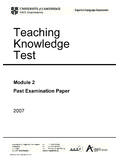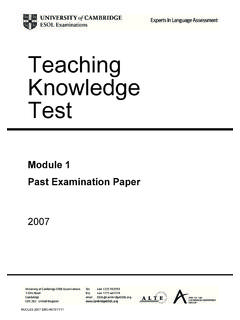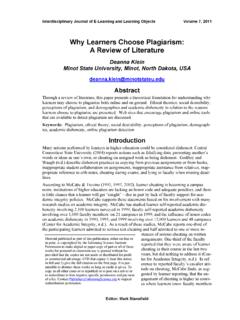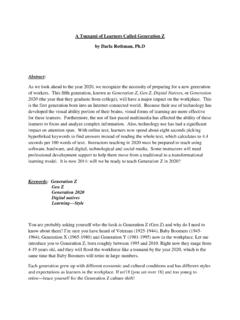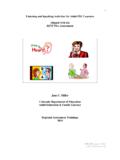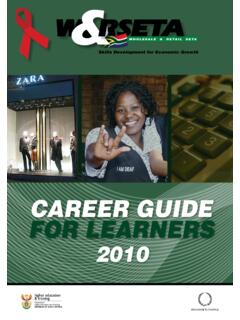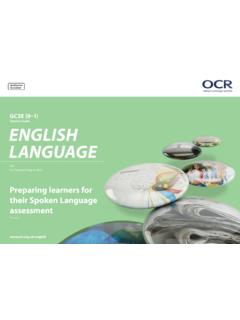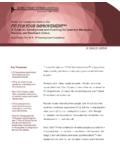Transcription of Teaching Knowledge Test (TKT) Young Learners (YL)
1 *2589198370* UCLES .,-, EMC/214//,Y,497 8 1 9 0 6 4 3 8 9 6 8 ISBN 978-1-906438-96-8 Teaching Knowledge Test (TKT) Young Learners (YL)Handbook for of CambridgeESOL Examinations- Hills United KingdomTel+00 YL HANDBOOK | CONTENTSC ontentsPrefaceThis handbook is intended for course providers who are, or intend to become, involved in preparingcandidates for the TKT: Young Learners further information on any of the Cambridge ESOL examinations and Teaching awards, please contact:Cambridge ESOL Information, 1 Hills Road, Cambridge, CB1 2EU, United KingdomTel: +44 1223 553997, Fax: +44 1223 460278, email: overview of TKT: YL 6 General description and syllabus10 Preparing for the TKT.
2 YL module12 Sample test21 TKT: YL test administration21 Grading and results22 Special Circumstances23 Test production23 Support for candidates and course providers24 Frequently asked questions and answers24 Sample test answer key25 Sample OMR answer sheet26 ReferencesIntroduction Introduction to Cambridge ESOLTKT: Young Learners is designed and produced by Universityof Cambridge ESOL Examinations (Cambridge ESOL), adepartment of the University of Cambridge and part of theUniversity of Cambridge Local Examinations Syndicate, whichhas provided examinations in English for speakers of otherlanguages since 1913. Cambridge ESOL offers an extensiverange of examinations, certificates and diplomas for learnersand teachers of English, taken by over 3 million people a year,in more than 130 countries.
3 Introduction to TKT: Young Learners a test ofprofessional Knowledge for English language teacherswho teach English to Young learnersHow Young is a Young learner? The term Young learneris interpreted differently around theworld. TKT: Young Learners defines ayoung learneras a childwho is in their first six years of formal education, from the ageof 6 to 12. The reason for this choice is that the lower limit of6 roughly corresponds to the start of formal schooling in manycountries, while the upper age of 12 approximates to a timewhen many children have begun to experience significantcognitive and emotional changes. This definition is alsobroadly in line with Cambridge ESOL s own definition of 7-12for its Starters, Moversand Flyersexams for Young Learners .
4 How is Teaching English to Young Learners differentfrom Teaching English to adults?There are of course similarities between Teaching younglearners and Teaching adults. Teachers of adults and teachersof Young Learners may need many of the same skills inplanning, Teaching and classroom management, for need good language proficiency. Depending upon theeducational and cultural context in which they are working,the aims of their Teaching may often be similar. Both, forexample, may be concerned with helping Learners tounderstand and communicate, and to develop learningstrategies which help them to learn independently of theteacher. Like adults, Young Learners are individuals with their owncharacteristics, likes, dislikes and beliefs.
5 It is thereforedifficult to generalise about Teaching them. However, four keydifferences between Teaching Young Learners and adults aresummarised in the following section. 1. Unlike many adults, Young Learners are stilldeveloping cognitively, linguistically, socially,emotionally and physically. To a far greater extent than adults, Young Learners aged 6-12are developing their thinking skills, their first languagesystems, discovering rules for interacting with others,understanding their own reactions to others and to events,and learning to develop hand-eye coordination and othermotor skills. Smith (1995) summarises by describing younglearners as products in process . The breadth, volume andspeed of this early development also means that there aresignificant differences in the abilities, interests andcharacteristics of children within the 6-12 age range.
6 Therecan, for example, be significant learner variables between say,children aged 8-9, and children aged 10-11 (Cephe and Teflik2001). 2. Unlike many adults, Young Learners often have noobvious reason for learning adults choose to learn English for specific job-related orpersonal purposes. Learners at secondary school are oftenmotivated to learn English in order to pass an exam, get a job,or go to university. Young Learners , by contrast, are generallyconscripts in language classes (even in private languageclasses), and may have no obvious reasons for learningEnglish. They generally do not need, for example, to order ameal in English, give directions, or discuss the weather (Clark1990), all typical focuses of an adult early language learningclass.
7 However, the lack of a clear reason for learning Englishmay not worry the Young learner, who will very often bringgoodwill, energy and curiosity to learning. 3. Unlike many adults, Young Learners may notalways have well-developed literacy skills to supporttheir learning of English. Many children at the younger age of the 6-12 spectrum maynot be able to read and write in their own language, or may bestarting to read and write L1, sometimes in a different script,in parallel with learning to read and write in English. It isoften the case, therefore, that children up to the age of about 9may not be able to use an ability to read or write to supporttheir learning in a foreign language. Cameron (2001:108) refersto this phenomenon as a literacy skills lag.
8 This means thatin many Young learner classrooms talk is the main medium ofinput, as children may not yet have the skills to decodemeaning from : YL HANDBOOK | INTRODUCTION2professional development. However, it is likely that centresand other institutions will offer preparation courses for theTKT: YL module. These may include practical issues arisingfrom specific Young learner contexts and some teachingpractice. It should be noted that TKT: YL tests Knowledge ofteaching Young Learners rather than Teaching ability. The TKT: YL module offers candidates a step in theirprofessional development as teachers. As a result of the globalneed for language learning, candidates who are languageteachers can add TKT: YL to their existing qualifications.
9 The TKT: YL module can be taken at any stage in a teacher scareer. It is suitable for pre- or in-service teachers of Englishor classroom assistants who work with Young Learners ofEnglish. It is intended for international candidates who mayeither be non-first language or first language teachers. It issuitable for general Young learner teachers who already teachother curriculum subjects in their first language, specialistyoung learner teachers who teach only English, or teachers ofolder Learners or adults who also teach Young Learners . Thismodule forms part of a framework of Teaching awards andtests for teachers offered by Cambridge ESOL. This includesthe Teaching Knowledge Test (TKT); TKT: Content andLanguage Integrated Learning (CLIL); TKT: Knowledge aboutLanguage (KAL); TKT: Practical; CELTA (Certificate in EnglishLanguage Teaching to Adults); ICELT (In-service Certificate inEnglish Language Teaching ); and the three Delta (Diploma inEnglish Language Teaching to Adults) modules.
10 These arebased on the following content areas: language Knowledge ,pedagogical Knowledge , pedagogical content Knowledge andknowledge of context. A summary of the entry requirementsand content of Cambridge ESOL s Teaching awards and testsfor teachers can be found on page Unlike many adults, Young Learners often learnslowly and forget popular belief that somehow Young Learners find it mucheasier to learn than adults is attractive, but not supported byevidence from classroom contexts where children learnEnglish as a foreign language in their own country for a fewlessons a week. From the rather limited evidence available,research tends to show that older Learners (from 13 or so andup) may have advantages in terms of remembering grammarand vocabulary (Aitchison 2003, Snow and Hoefnagel-Hohle1978), possibly due to advantages over younger Learners inlearning skills and cognition.
